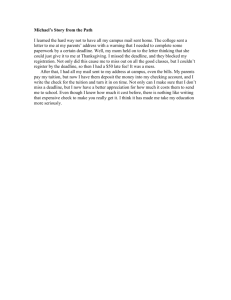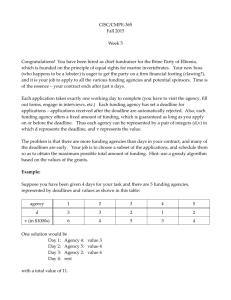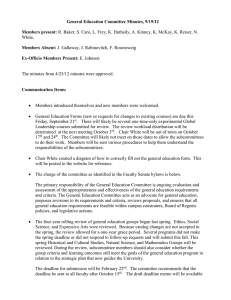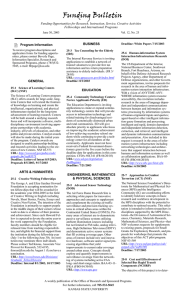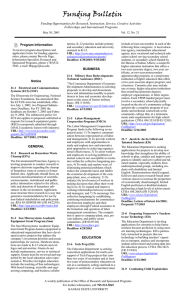Funding Bulletin
advertisement
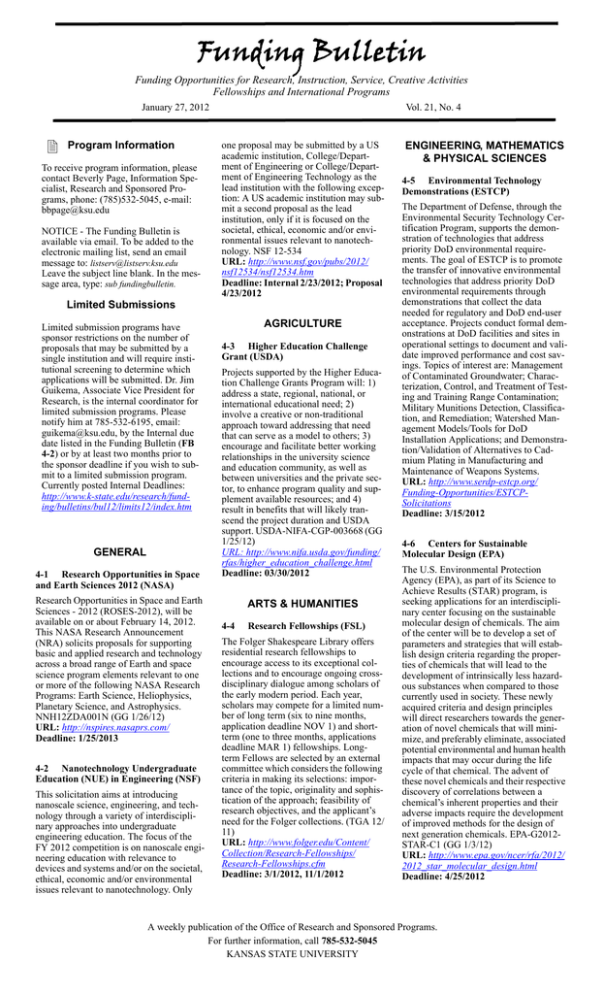
Funding Bulletin Funding Opportunities for Research, Instruction, Service, Creative Activities Fellowships and International Programs January 27, 2012 Program Information To receive program information, please contact Beverly Page, Information Specialist, Research and Sponsored Programs, phone: (785)532-5045, e-mail: bbpage@ksu.edu NOTICE - The Funding Bulletin is available via email. To be added to the electronic mailing list, send an email message to: listserv@listserv.ksu.edu Leave the subject line blank. In the message area, type: sub fundingbulletin. Vol. 21, No. 4 one proposal may be submitted by a US academic institution, College/Department of Engineering or College/Department of Engineering Technology as the lead institution with the following exception: A US academic institution may submit a second proposal as the lead institution, only if it is focused on the societal, ethical, economic and/or environmental issues relevant to nanotechnology. NSF 12-534 URL: http://www.nsf.gov/pubs/2012/ nsf12534/nsf12534.htm Deadline: Internal 2/23/2012; Proposal 4/23/2012 Limited Submissions Limited submission programs have sponsor restrictions on the number of proposals that may be submitted by a single institution and will require institutional screening to determine which applications will be submitted. Dr. Jim Guikema, Associate Vice President for Research, is the internal coordinator for limited submission programs. Please notify him at 785-532-6195, email: guikema@ksu.edu, by the Internal due date listed in the Funding Bulletin (FB 4-2) or by at least two months prior to the sponsor deadline if you wish to submit to a limited submission program. Currently posted Internal Deadlines: http://www.k-state.edu/research/funding/bulletins/bul12/limits12/index.htm GENERAL 4-1 Research Opportunities in Space and Earth Sciences 2012 (NASA) Research Opportunities in Space and Earth Sciences - 2012 (ROSES-2012), will be available on or about February 14, 2012. This NASA Research Announcement (NRA) solicits proposals for supporting basic and applied research and technology across a broad range of Earth and space science program elements relevant to one or more of the following NASA Research Programs: Earth Science, Heliophysics, Planetary Science, and Astrophysics. NNH12ZDA001N (GG 1/26/12) URL: http://nspires.nasaprs.com/ Deadline: 1/25/2013 4-2 Nanotechnology Undergraduate Education (NUE) in Engineering (NSF) This solicitation aims at introducing nanoscale science, engineering, and technology through a variety of interdisciplinary approaches into undergraduate engineering education. The focus of the FY 2012 competition is on nanoscale engineering education with relevance to devices and systems and/or on the societal, ethical, economic and/or environmental issues relevant to nanotechnology. Only AGRICULTURE 4-3 Higher Education Challenge Grant (USDA) Projects supported by the Higher Education Challenge Grants Program will: 1) address a state, regional, national, or international educational need; 2) involve a creative or non-traditional approach toward addressing that need that can serve as a model to others; 3) encourage and facilitate better working relationships in the university science and education community, as well as between universities and the private sector, to enhance program quality and supplement available resources; and 4) result in benefits that will likely transcend the project duration and USDA support. USDA-NIFA-CGP-003668 (GG 1/25/12) URL: http://www.nifa.usda.gov/funding/ rfas/higher_education_challenge.html Deadline: 03/30/2012 ARTS & HUMANITIES 4-4 Research Fellowships (FSL) The Folger Shakespeare Library offers residential research fellowships to encourage access to its exceptional collections and to encourage ongoing crossdisciplinary dialogue among scholars of the early modern period. Each year, scholars may compete for a limited number of long term (six to nine months, application deadline NOV 1) and shortterm (one to three months, applications deadline MAR 1) fellowships. Longterm Fellows are selected by an external committee which considers the following criteria in making its selections: importance of the topic, originality and sophistication of the approach; feasibility of research objectives, and the applicant’s need for the Folger collections. (TGA 12/ 11) URL: http://www.folger.edu/Content/ Collection/Research-Fellowships/ Research-Fellowships.cfm Deadline: 3/1/2012, 11/1/2012 ENGINEERING, MATHEMATICS & PHYSICAL SCIENCES 4-5 Environmental Technology Demonstrations (ESTCP) The Department of Defense, through the Environmental Security Technology Certification Program, supports the demonstration of technologies that address priority DoD environmental requirements. The goal of ESTCP is to promote the transfer of innovative environmental technologies that address priority DoD environmental requirements through demonstrations that collect the data needed for regulatory and DoD end-user acceptance. Projects conduct formal demonstrations at DoD facilities and sites in operational settings to document and validate improved performance and cost savings. Topics of interest are: Management of Contaminated Groundwater; Characterization, Control, and Treatment of Testing and Training Range Contamination; Military Munitions Detection, Classification, and Remediation; Watershed Management Models/Tools for DoD Installation Applications; and Demonstration/Validation of Alternatives to Cadmium Plating in Manufacturing and Maintenance of Weapons Systems. URL: http://www.serdp-estcp.org/ Funding-Opportunities/ESTCPSolicitations Deadline: 3/15/2012 4-6 Centers for Sustainable Molecular Design (EPA) The U.S. Environmental Protection Agency (EPA), as part of its Science to Achieve Results (STAR) program, is seeking applications for an interdisciplinary center focusing on the sustainable molecular design of chemicals. The aim of the center will be to develop a set of parameters and strategies that will establish design criteria regarding the properties of chemicals that will lead to the development of intrinsically less hazardous substances when compared to those currently used in society. These newly acquired criteria and design principles will direct researchers towards the generation of novel chemicals that will minimize, and preferably eliminate, associated potential environmental and human health impacts that may occur during the life cycle of that chemical. The advent of these novel chemicals and their respective discovery of correlations between a chemical’s inherent properties and their adverse impacts require the development of improved methods for the design of next generation chemicals. EPA-G2012STAR-C1 (GG 1/3/12) URL: http://www.epa.gov/ncer/rfa/2012/ 2012_star_molecular_design.html Deadline: 4/25/2012 A weekly publication of the Office of Research and Sponsored Programs. For further information, call 785-532-5045 KANSAS STATE UNIVERSITY 4-7 Centers for Material Life Cycle Safety (EPA) Deadline: 3/1/2012, 10/1/2012 The U.S. Environmental Protection Agency (EPA), as part of its Science to Achieve Results (STAR) program, is seeking applications for an interdisciplinary center focused on the application of a life cycle perspective towards the development of materials. The aim of the center will be to develop methodologies and practices for materials design which applies a holistic perspective. This holistic approach to design, which considers all the stages of a material’s life cycle, provides an opportunity to produce materials which minimize, and preferably eliminate, any associated potential environmental and human health impacts that may occur during the life cycle. The Center will focus on the design and development of materials that apply sustainability principles for chemistry and engineering across all stages of the material’s life cycle. The term “materials” broadly refers to any and all types of chemicals, including individual chemicals, compounds, mixtures of compounds, or products. Such examples of materials include a discreet molecule, a polymer, a nanomaterial or a biochemical. EPA-G2012-STAR-B1 URL: http://www.epa.gov/ncer/rfa/2012/ 2012_star_lifecycle.html Deadline: 4/25/2012 4-10 Mechanisms Mediating Osteoarthritis in Aging (RO1) (NIA) HEALTH & LIFE SCIENCES 4-8 Pilot/Feasibility Grant Announcement (GPCAH) The Great Plains Center for Agricultural Health (GPCAH) is pleased to announce a small grant program for fiscal year 2013. We invite proposals for two types of projects: basic and applied research projects addressing agricultural safety and health priority issues, needs, or gaps, and community partnering proposals from community-based organizations and entities with special ability to engage in outreach, education, and translation of evidence-based methods for preventing agricultural injury and illness among agricultural workers. URL: http://www.publichealth.uiowa.edu/gpcah Deadline: 3/19/2012 The National Institute on Aging and the National Institute of Arthritis and Musculoskeletal and Skin Diseases invite applications that are intended to encourage and accelerate the characterization of new or underutilized models and the testing of hypotheses that will lead to an improved understanding of the mechanisms mediating osteoarthritic progression. PA-12-019 (NIHG 11/18/11) URL: http://grants.nih.gov/grants/guide/ pa-files/PA-12-019.html Deadline: 2/5/2012, 6/5/2012, 10/5/2012 INTERNATIONAL 4-11 Science and Mathematics Model Schools Program (USAID) The Science and Mathematics Model schools program will introduce advanced science and mathematics education to Egyptian students by creating three to five science- and math-focused public secondary (high) schools in targeted governorates. These schools will: prepare a cohort of students and teachers with specialized skills; reinforce collaboration with U.S. STEM schools and universities; expand utilization of appropriate networks between Egypt and the U.S.; and raise awareness of specialized science and mathematics education among the public. As centers of excellence, these schools will contribute to workforce development by focusing on specific science and mathematics fields, allowing a diverse group of gifted students to progress into higher education and preparing them to be proficient workers, capable of dealing with the demands of a science-based workforce and continue the research and development that is central to the economic growth of the country. RFA-263-12000020 (GG 1/23/12) URL: http://www07.grants.gov Deadline: 3/5/2012 The Johnson Cancer Research Center supports cancer research and training at K-State. Faculty members conducting cancer-relevant research are invited to affiliate with the center and apply for various awards. Innovative Research Awards provide seed money to gather preliminary data crucial for future major grant proposals. Faculty Equipment Awards provide funds for new equipment. Travel Awards are provided in modest amounts for travel to learn new scientific techniques or visit collaborators at other institutions. Awards for graduate student travel and summer stipends are also available. URL: http://cancer.k-state.edu/awardprograms/ 4-13 Congressional Research Awards (Dirksen) The Dirksen Congressional Center invites applications for grants to fund research on congressional leadership and the U.S. Congress. The Center, named for the late Senate Minority Leader Everett M. Dirksen, is a private, nonpartisan, nonprofit research and educational organization devoted to the study of Congress and its leaders. Political scientists, historians, biographers, scholars of public administration or American studies, and journalists are among those eligible. (TGA 12/ 11) URL: http://www.dirksencenter.org/ print_grants_CRAs.htm Deadline: 3/1/2012 R.W. Trewyn, Vice President for Research SOCIAL SCIENCES 4-12 Workplace Violence in the Military (DOD) 4-9 Awards for Cancer-Relevant Research and Training (KSU) Announcement is behavioral-based predictors of potential targeted acts of violence in the workplace. Targeted violence refers to deliberate and planned violent acts toward a specific target or set of targets. Such acts may also include threatening or intimidating behavior as precursors to the intended violent activity. Targeted violent behavior is not to be confused with random or impulsive violent acts. The intent of this Program Announcement is not to focus on targeted acts of violence that have previously been extensively studied (e.g., acts of terrorism, sexual assault, child abuse). The primary environment for both studies is the occupational setting. Domestic violence and child abuse are not a primary focus; however, they may constitute a component of workplace violence if the individual is in uniform as they are considered on duty 24/7, and/or if the physical assault occurs in garrison. W81XWH-12-PHTBI-WVM (GG 1/24/12) URL: http://www07.grants.gov Deadline: Preapplications 2/27/2012 Applications for the Psychological Health and Traumatic Brain Injury (PH/TBI) Research Program Announcement (PA) for Workplace Violence in the Military are being solicited by the Assistant Secretary of Defense for Health Affairs, Defense Health Program (DHP). The PH/ TBI Research Program was established in FY07 for the purpose of complementing ongoing Department of Defense (DoD) efforts towards promoting optimal care for PH (including workplace violence across the DoD service areas) and TBI in the areas of prevention, detection and intervention. This includes research to benefit service members, their family members, veterans and other beneficiaries of the Military Health System (MHS). The primary focus of this Program Jim Guikema, Associate Vice President for Research Caron Boyce, Administrative Specialist Preaward Section Paul Lowe, Director Anita Fahrny, Assistant Director Kathy Tilley, Rich Doan, Carmen Garcia, Adassa Roe, Katie Small, Rex Goff, Susan Klein, Sharon Zoeller Funding Information Specialist & Editor Beverly Page Development Director Mary Lou Marino Human Subjects, Animal Care & Use, and Biosafety Gerald P. Jaax, Associate Vice President, Research Compliance Heath Ritter, Compliance Monitor Adrian Self, Administrative Specialist Congressional Relations Sue Peterson, R.W. Trewyn A weekly publication of the Office of Research and Sponsored Programs. For further information, call 785-532-5045 KANSAS STATE UNIVERSITY
